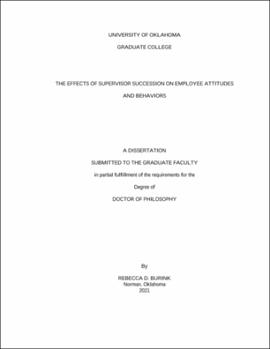| dc.description.abstract | For over sixty years, researchers have examined various facets of leader succession, mainly in terms of its implications for the leader and the organization. In the last fifteen years, scholars have started exploring the effects of leader and supervisor succession on the frontline employees who remain after the leader departs; nevertheless, our understanding of this issue remains incomplete. This is an important oversight for at least two reasons. First, the relationships between leaders and followers have important implications for organizational functioning; indeed, strong relationships between supervisors and subordinates are associated with several beneficial outcomes for organizations, including increased employee performance. Second, given that organizations are less stable, and people change jobs more frequently than in the past, the implications of supervisor succession are a continual challenge for organizations and their employees.
This dissertation explores how supervisor succession events affect employees by examining the attitudinal and behavioral outcomes associated with a change in supervisor, with particular attention on how the characteristics of the employee, the change itself, the employee’s workgroup, and the employee’s emotional reaction to the change influence those effects. Using data collected from 196 employees who had experienced a change in supervisor, the results indicate that the anticipated relationship with the new supervisor influence employee job attitudes (i.e., organizational commitment, job satisfaction, turnover intentions). The findings also suggest that employee personality traits (i.e., openness to experience, conscientiousness, agreeableness) are related to behavioral outcomes following a change in supervisor. Finally, there is some evidence that strong task- and interpersonal-oriented relationships between workgroup members and coworkers can attenuate the negative or disruptive effects associated with a change in supervisor. The theoretical and practical implications of this dissertation are discussed. Limitations and directions for future research are also addressed. | en_US |
